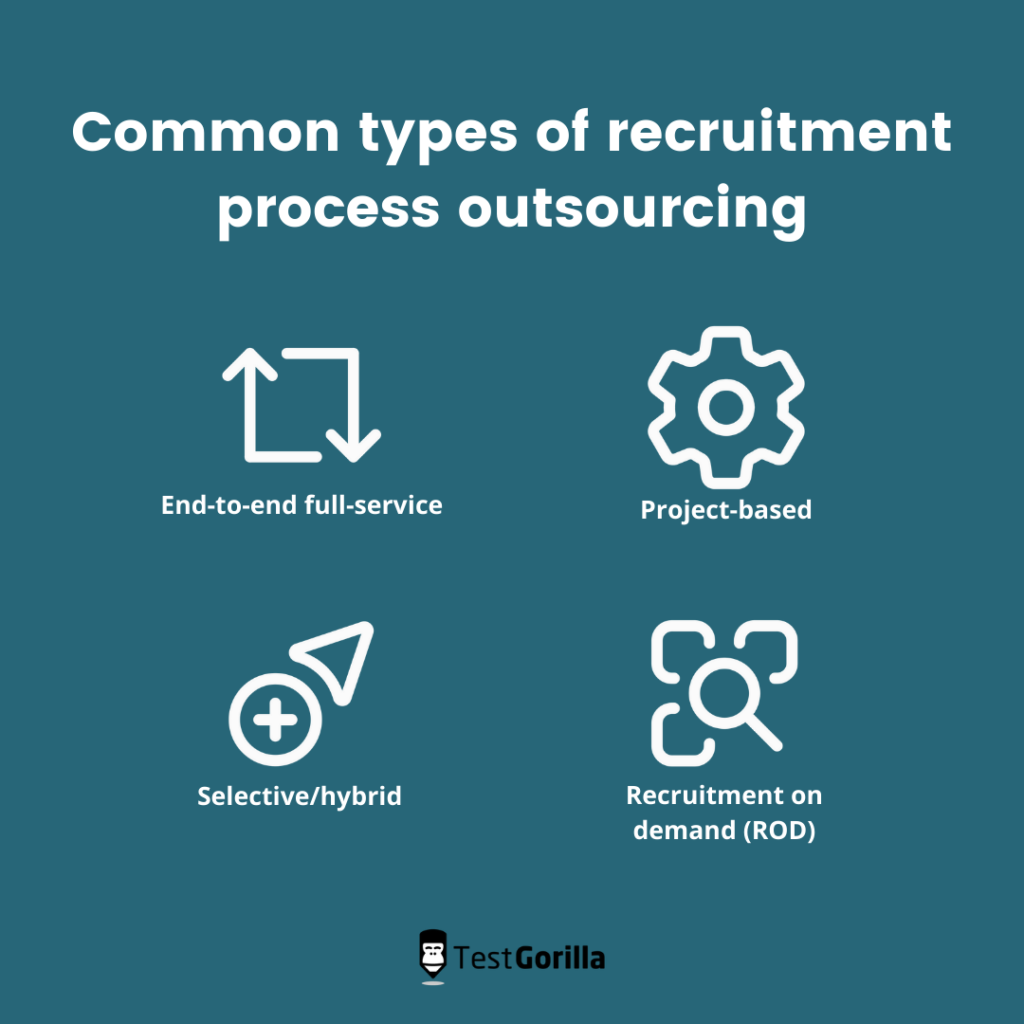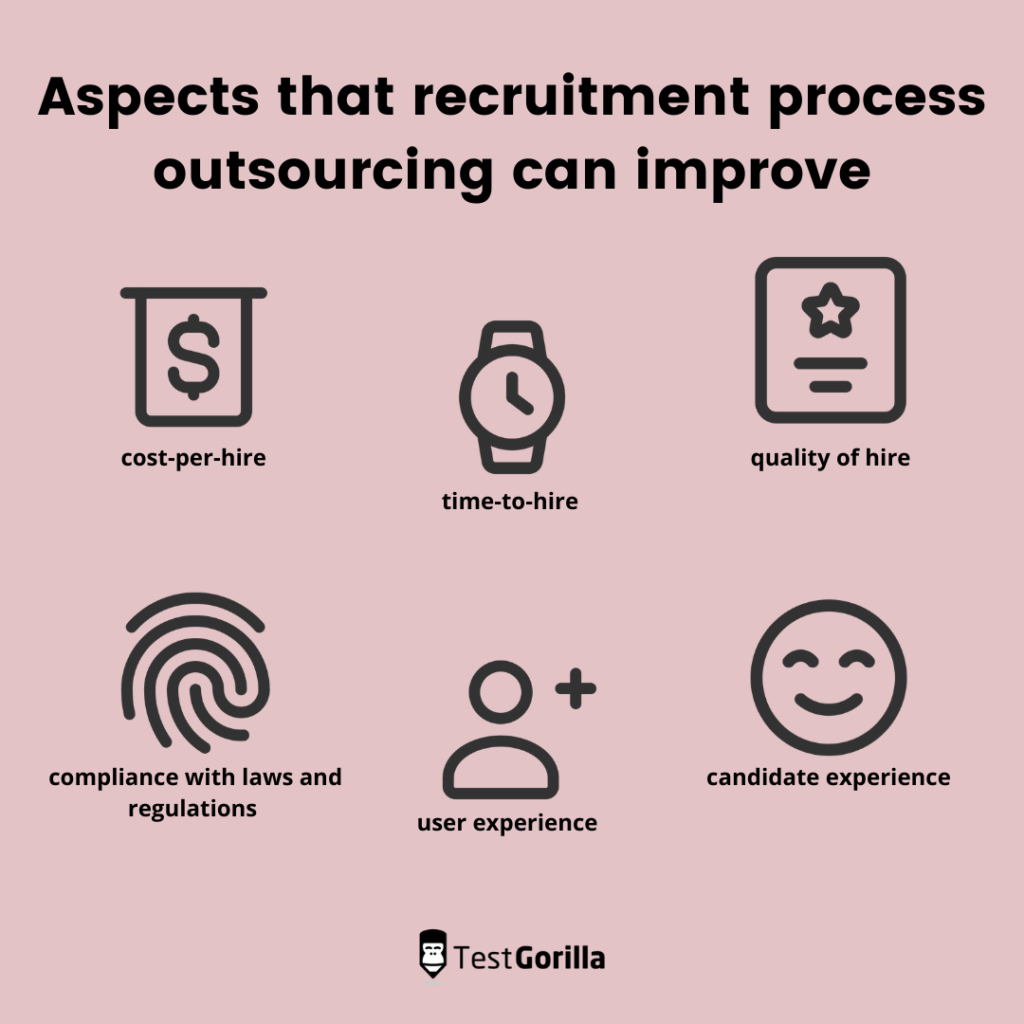Table of contents
The job marketplace has changed drastically over the past couple of years, and that change has had a profound impact on recruitment processes. Companies realized that they could outsource most of their non-fundamental tasks to external providers and get better results at a lower cost. The same thing applies to companies that started using recruitment process outsourcing (RPO): they saw their recruitment costs go down while getting better candidates.
RPO is a multi-billion dollar industry whose main focus is to ensure that medium and large-size companies and enterprises get the best out of their recruitment process.
With all that said, let’s see what exactly is recruitment process outsourcing, what are the benefits of using it, and how they differ from other staffing methods.
What is recruitment process outsourcing?
Recruitment process outsourcing is a business process where a company partially or entirely transfers its recruitment process to an external service provider. It’s a form of business process outsourcing (BPO) that usually has a front office and back office.
An RPO provider helps companies solve one of their most pressing recruitment problems—finding suitable candidates that will become great employees. According to Manpower Group, almost 70% of businesses worldwide report talent shortages, meaning that they can’t find the right applicants to fill open positions. RPO providers can help companies overcome this challenge and find the best candidates, which explains their success in the market.
The industry started developing almost 20 years ago; today, there are a few different types of RPO on the market. Here are the four most common types:
End-to-end full-service RPO
A full-service RPO is an ongoing solution that will cover all facets of your recruitment process. The RPO provider will handle your sourcing, screening, scheduling interviews, preparing and presenting offers, employer branding, talent marketing, and managing onboarding activities.
The end-to-end RPO service is usually the most cost-effective and it will provide the best results, but this is also the most challenging model to implement.
Project-based RPO
A project-based RPO is an end-to-end approach but only applied to a specific hiring project, such as opening a new branch of an office, a product launch, or creating a new team. This is an excellent solution if you need an end-to-end approach for a limited time, but you still want to retain internal processes and capacities to recruit people.
Also, it’s a good idea to try a project-based RPO as a test to see how the company will integrate with an external service provider and what the results of the process will be. The benefits of this type of RPO are significant since you get a highly experienced team that will handle the recruitment for the project, and your internal HR team can learn a lot from them.
Selective/hybrid RPO
A selective RPO is usually used when a company has problems only with a certain aspect of recruitment, such as sourcing or screening candidates. In this case, a company will hire an RPO provider to deal with the element of the recruitment process that’s causing problems to the internal team.
Here, you receive RPO services only for specific HR recruitment processes.
Recruitment on demand (ROD)
On-demand recruitment means having a contract with an RPO provider who knows the company’s messaging, processes, and the results that the company needs. This model helps solve recruitment problems when it comes to spikes in hiring or to new business initiatives. ROD does not result in a transformation of the hiring process as other types of RPOs do.
Usually, one or two recruiters from the RPO provider will work with your team and help out with the recruitment process for a specific and agreed-upon time (usually for a project or a new initiative). The recruiters bring in their experience and expertise, which helps create a positive candidate experience and fulfill the company’s business needs.
How is RPO different from other types of outsourced recruitment?
An RPO does four things that other outsourced recruitment companies (like agencies) don’t. With an RPO, you’re making sure you can:
Find the best fit. RPO providers find candidates from all sources—no talent pool is off the limits of an RPO. Their job is to ensure that you get the best possible fit. On the other hand, agencies usually already have a list of their own candidates that they present to the company. These aren’t always the best possible match for the company, while an RPO ensures that you get the best possible candidate from all talent pools out there.
Get candidate ownership. A recruitment agency usually has ownership over the presented candidates, while an RPO provider doesn’t. If working with an RPO, you have ownership of the applicants; the RPO’s job is just to provide you with them.
Manage the entire process. RPOs aim to create long-term business relationships with companies. Because of this, RPO providers often manage the recruitment process as a whole and help businesses build their employer brand and provide a positive candidate experience.
Manage your expenses. An RPO provider has a couple of ways they can charge for their service: cost per slate, cost per transaction, cost per hire, or use a management fee model. RPO providers use the management fee model the most—they charge a monthly management fee for the process. Not only is this model cheaper than what most agencies charge, but it also lets your internal HR team focus on other tasks at hand, such as developing vital management skills, developing a talent strategy, and building an organizational culture.
The best insights on HR and recruitment, delivered to your inbox.
Biweekly updates. No spam. Unsubscribe any time.
What are the benefits of using an RPO?
Recruitment process outsourcing has many advantages and benefits. Here are the most important ones. RPOs can help you:
Source the right candidates
An RPO enhances your workforce planning and ensures that you keep your hiring processes agile. With this, an RPO can deliver the right candidates at the right time to your company – top talent only – and fulfill your hiring needs.
Shorten the time-to-hire (and make recruitment less stressful for hiring managers)
Reducing stress for your hiring managers is always a good thing, and an RPO does that by reducing the time-to-hire, therefore freeing up resources that you can use for other initiatives. The process is faster, thanks to their engagement levels with candidates.
Leverage technology to provide you with the best candidates
An RPO sources candidates from different talent pools, and they leverage technology to do that. Also, with the insights they get from different technologies and methods, such as talent analytics, AI, and monitoring, they can scale their efforts to effectively use their – and your – time.
Are cost-effective
An agency will almost always be much more expensive than an RPO: an RPO is often more cost-effective, as it has highly efficient processes in place to source and vet candidates and find top talent for the company; it’s simply better for the bottom line. A company just needs to decide what type of RPO is the best for them: end-to-end, project-based, hybrid, or recruitment on demand.
Improve your hiring process, helping you make it more efficient and scalable
RPO service providers work with key performance indicators (KPIs) to manage the recruitment process over time and make it as efficient as possible. By measuring their activities, objectives, and key results, an RPO will create and improve the hiring process to increase effectiveness, scalability, and cost-efficiency. Some of the aspects of the hiring process an RPO will improve are:
the cost-per-hire
the time-to-hire
the quality of hire and quality of candidates in the pipeline
user experience
candidate experience (levels of satisfaction of the candidates with the process)
That leads us to the last benefit:
Create and maintain a successful employer brand
A good RPO will build a positive employer brand for the company they work with. They know that building a positive company image requires time and effort, but that results far outweigh the costs: candidates will apply because of the employer brand, the RPO will have a passive lead generation source thanks to the brand image of the business, and they will acquire better candidates for the company they work with. These reasons are why an RPO creates, invests resources into, and maintains their clients’ employer brand.
Do RPOs have any downsides?
Since RPOs provide inevitable trade-offs, they can have some downsides as well:
Communication problems. When you decide to hire an RPO, you give them the right to lead a part of or the entire hiring process. With that in mind, communication can be a problem since you won’t always get instant updates on what’s happening in the hiring process. Also, you will need to establish clear communication guidelines with the RPO provider, so you’re always up-to-date with what’s happening.
Lack of control. If communication problems create trouble in the internal process, the lack of control creates a problem in the external process (outlook). An RPO isn’t just recruiting for a company; they are also representing the employer brand of that company. Because of that, they will need to maintain a specific brand the company has created or wants to create. With an RPO provider, you’re giving them a part of the control of that process, which can be a problem if not managed correctly.
Culture differences. Since RPO providers don’t necessarily work with your internal teams, there might be a mismatch in organizational culture. Each company has a unique culture that is based on their core values, mission, and vision. An RPO provider needs to have all that information to make the best possible hiring decisions.
Ramp-up time. Some industries, like finance, tech, or legal, might have specific needs that the RPO provider isn’t aware of. A company needs to update the RPO provider with all the necessary information on their particular needs and requirements, which will inevitably take some time. So you should plan the ramp-up time needed for the RPO provider to know all the intricacies of your business industry.
RPOs help you invest your time where it matters
Recruitment process outsourcing is a business process that helps companies by ensuring two things: that the company will be able to source the best possible candidates and focus its internal resources on things that matter.
If you decide to use an RPO, one thing you need to figure out is the type of RPO you need: an end-to-end, full-service, or a project RPO, a selective or hybrid model, or a recruiter on demand. Whatever the service is, it will be far more cost-effective than getting a traditional recruiting agency to do staffing for your company. If you need more help with recruitment processes, check out how to make your hiring decisions faster, easier, and bias-free with TestGorilla.
You've scrolled this far
Why not try TestGorilla for free, and see what happens when you put skills first.
















